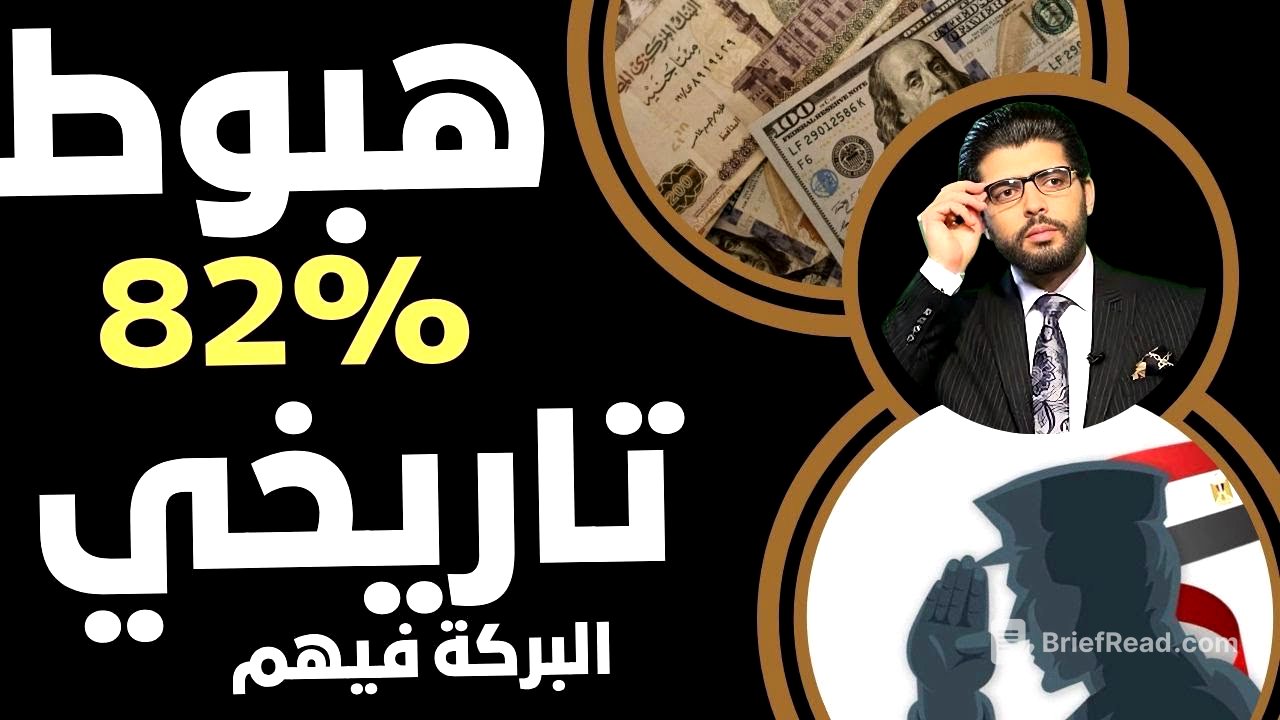TLDR;
This video discusses recent economic decisions and their potential impacts on the Egyptian market, particularly focusing on the cement and poultry industries. It highlights concerns about market manipulation, the role of the government, and the implications for small and medium-sized investors.
- The speaker criticizes government intervention in the market, particularly in the cement and poultry industries.
- Concerns are raised about the dominance of certain entities in the market and the potential negative impacts on small and medium-sized investors.
- The creation of a new commodity exchange controlled by the Egypt Future Authority is questioned, especially regarding its impact on existing importers and exporters.
Historic Drop and Market Rules [0:13]
The speaker opens by welcoming viewers and expressing that any patriotic Egyptian would welcome a historic drop in prices of essential goods. He argues that such drops benefit the population by increasing supply, consumption, and demand. However, he cautions against drops in quality and strict market control, emphasizing that the rules of the free market are in place to protect the country from violations that could lead to major price fluctuations and market imbalances.
Cement Industry Intervention [2:45]
The speaker discusses the government's decision to give cement factories a 30-day grace period to maximize production, which led to a significant drop in cement prices. He suggests that this decision was influenced by the fact that the decision-maker is heavily involved in the construction industry, holding significant land and contracting interests. The speaker also points out that the use of Israeli gas to power these factories and the potential costs associated with maintaining electricity supply could lead to a scandal in the balance of payments report.
Poultry Market Manipulation [5:48]
The speaker criticizes the government's actions in the poultry market, specifically the withdrawal of 2,000 tons of chickens from the Poultry Producers Union. He questions the logic behind this decision, arguing that increasing supply would naturally lower prices. He claims that the price of chicks has risen significantly, benefiting those who control the market while small and medium-sized breeders are forced to exit. This, according to the speaker, poses a threat to national security by concentrating control of the poultry market in the hands of a few.
Poultry Producers Exit and Chick Prices [12:19]
The speaker elaborates on the exit of small and medium-sized Egyptian breeders from the poultry market, questioning who will replace them. He points out the difficulties these breeders face, including high costs for electricity and supply chains, making it impossible for them to compete with larger entities that receive subsidies. The speaker highlights the significant drop in chick prices, with a chick now selling for 10 pounds compared to 60-65 pounds in the previous month, indicating a severe market imbalance.
IMF Report and Market Recession [15:52]
The speaker references an IMF report that highlights the inability of chicken farmers to compete due to financial losses and unequal access to resources. He notes a general trend among breeders to reduce production by 50% due to market uncertainties. The speaker predicts that the current situation will lead to a severe recession in the market and a future increase in chicken prices, potentially reaching 150-180 pounds per kilo, as a few dominant players control the market.
New Stock Exchange and Presidential Statement [21:06]
The speaker discusses the creation of a new commodity exchange by the Egypt Future Authority, which is linked to the armed forces. He questions the need for a second stock exchange and expresses concern that it will become the sole entity for importing and exporting basic food commodities. According to a presidential statement, this exchange aims to enhance food security and ensure the availability of basic commodities at reasonable prices. However, the speaker suggests that this move will further consolidate control in the hands of the Authority, limiting the role of existing importers and exporters.
Importing Frozen Poultry and Market Control [25:11]
The speaker criticizes the government's decision to import 4,000 tons of frozen poultry from Brazil while simultaneously withdrawing 2,000 tons of locally produced poultry from the market. He questions the logic behind this move, suggesting that it is designed to benefit those who control the market and hoard dollars. The speaker argues that the government's actions are creating violent disturbances in the market and undermining the competitiveness of local producers.
Economic Thinking and International Agreements [29:41]
The speaker summarizes the situation, highlighting that efforts are being made to prevent chicken prices from decreasing, engineering supply and demand, and establishing a single entity as the importer, exporter, local buyer, and sole seller. He contrasts this with the thinking of a country that should be focused on long-term economic growth rather than short-term profits. The speaker questions why a presidential statement is being used to announce a chicken agreement rather than focusing on broader international agreements. He concludes by criticizing the decision to import poultry from Brazil while discouraging local investment, suggesting that it benefits foreign investors at the expense of Egyptian producers.









